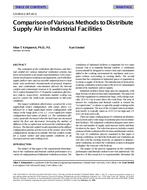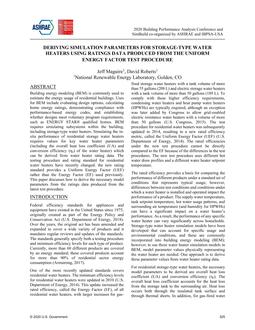Click here to purchase
Liquid-to-air membrane energy exchangers (LAMEEs) transfer heat and moisture between a liquid desiccant solution and airstreams through vapor-permeable membranes. Liquid desiccant membrane air-conditioning (M-LDAC) systems imple-ment LAMEEs to meet the latent or dehumidification loads in buildings. M-LDAC systems are better suited to dehumidify air than conventional air-conditioning (CAC) systems. One way to enhance the performance of LAMEEs is to install cooling/heating tubes inside the solution channels to control the solution tempera-ture inside the LAMEE. Such an exchanger is called a three-fluid LAMEE. The main objectives of this study are to develop a Transient System Simulation (TRNSYS) model of the three-fluid LAMEE and use it to simulate the performance of a three-fluid M-LDAC system under low, medium, and high latent load conditions. The results show that the three-fluid M-LDAC system out performs the two-fluid M-LDAC system under the high and medium latent load conditions, whereas the two-fluid M-LDAC system outper-formsthe three-fluid M-LDAC system under the lowest latent load condition.
Citation: 2019 Annual Conference, Kansas City, MO, Technical Papers
Product Details
- Published:
- 2019
- Number of Pages:
- 18
- Units of Measure:
- Dual
- File Size:
- 1 file , 1.4 MB
- Product Code(s):
- D-KC-19-009


